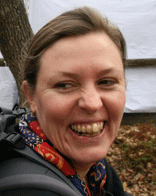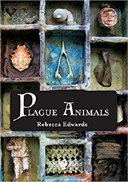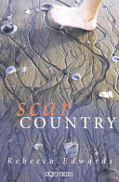Rebecca Edwards – May 16 2021
 Rebecca is a poet and visual artist. She is a graduate of the University of Queensland where she majored in Japanese. Rebecca has been an AsiaLink writer-in-residence at Keio University, a guest at major poetry festivals throughout Australia, and has held visual arts exhibitions in Tokyo, Townsville and Brisbane. Her first volume of poems, Eating the Experience, was published in 1994 and her unpublished long poem, ‘Night is the Smell of Burning’, won the inaugural Arts Queensland Poetry Award in 1999. Rebecca’s other published works include The River Sai, a young adult fantasy set in Japan; the verse novel, Holiday Coast Medusa, the first in an upcoming trilogy; and Crow Feathers: An Indigenous Collection of Poems and Images, co-edited with Janelle Evans. Rebecca’s work is influenced by a childhood spent in Papua New Guinea, Nauru and various parts of Australia; an exchange at age sixteen to Japan; and travel as an adult in Africa, Indonesia, South Korea and Japan, as well as her experience with mental illness. “Wierdly, the hauntings of profound depression can also be a source of inspiration, but, as David Marr once said, it’s hard to be creative if you’re dead. So I take the medication and remain above that level of hell, but I suspect I’m also removed somewhat from the kind of intensity – the intense pain – which was the way I once felt the world and wrote about it.” (Interview with Nicole Melanson, wordmothers.com)
Rebecca is a poet and visual artist. She is a graduate of the University of Queensland where she majored in Japanese. Rebecca has been an AsiaLink writer-in-residence at Keio University, a guest at major poetry festivals throughout Australia, and has held visual arts exhibitions in Tokyo, Townsville and Brisbane. Her first volume of poems, Eating the Experience, was published in 1994 and her unpublished long poem, ‘Night is the Smell of Burning’, won the inaugural Arts Queensland Poetry Award in 1999. Rebecca’s other published works include The River Sai, a young adult fantasy set in Japan; the verse novel, Holiday Coast Medusa, the first in an upcoming trilogy; and Crow Feathers: An Indigenous Collection of Poems and Images, co-edited with Janelle Evans. Rebecca’s work is influenced by a childhood spent in Papua New Guinea, Nauru and various parts of Australia; an exchange at age sixteen to Japan; and travel as an adult in Africa, Indonesia, South Korea and Japan, as well as her experience with mental illness. “Wierdly, the hauntings of profound depression can also be a source of inspiration, but, as David Marr once said, it’s hard to be creative if you’re dead. So I take the medication and remain above that level of hell, but I suspect I’m also removed somewhat from the kind of intensity – the intense pain – which was the way I once felt the world and wrote about it.” (Interview with Nicole Melanson, wordmothers.com)
 Plague Animals
Plague Animals
Puncher and Wattmann, 2020; ISBN 9781925780772
In this long-awaited second collection, award-winning poet Rebecca Edwards distills the experience of physical and mental trauma; the breakdown of her relationship with her eldest daughter and the attrition of mental illness. Each poem is an act of salvage, commemorating and celebrating the small, the overlooked, the voiceless and unloved. An artist throws his pots into the Brisbane River. Four dementia patients plot their escape from a nursing home. A woman mourns the end of a relationship at its conception. A man sees an ultrasound of his daughter and falls in love. Pain is forced to sing. The reader is asked to look again, to look closely, to see differently those things in themselves and others which convention frames as ugly or shameful, or insignificant. Subversive, quietly political, intellectually tough, exquisitely observed, the poems question what it is to be Australian, to be an outsider, to be human, to be uneasy in the world.
 Scar Country
Scar Country
University of Queensland Press, 2000; ISBN 9780702231872
This fascinating collection explores the landscape of the body with the gaze of the painter, in a language tempered by fire. In poems unflinchingly tough, describing relationships between friends and enemies, mother and child, the self and memory, the unspeakable is named. Crossing into a country with features both familiar and foreign, these poems explore to the edge our sense of healing and belonging, land and place. The final section contains the sweepingly powerful, award-winning poem, ‘Night Is the Smell of Burning’.
